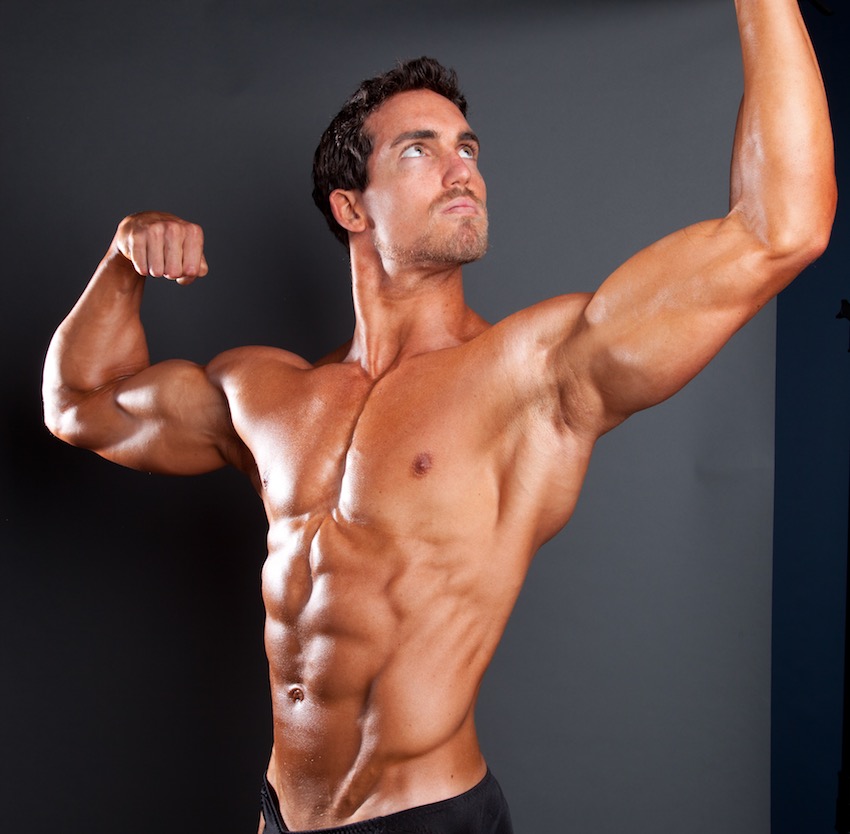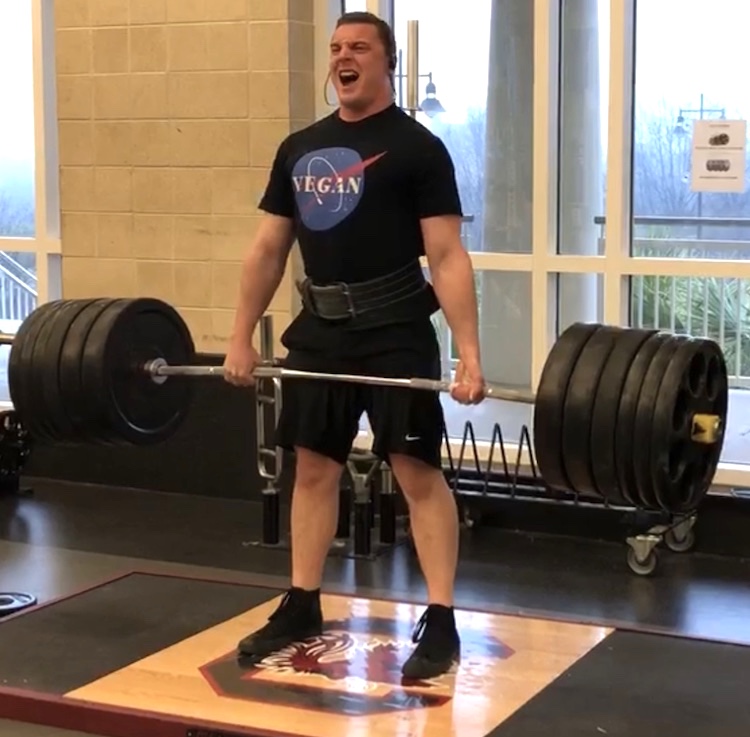Your body doesn’t exactly run on meat and plants and dairy. It runs on macronutrients and micronutrients (and, OK, enzymes and phytonutrients and other stuff) and there are no essential nutrients you can’t find on a plant-based diet.
… Except Vitamin B12, which both of the athletes we’re profiling today supplement with.
In this article (and the video below), we’re profiling two successful vegan athletes to to help you get an idea as to how they structure their nutrition in order to build muscle and deadlift over 500 pounds for reps.
And listen: they’re not weird. They eat a gram of protein per pound of bodyweight and have a macronutrient balance that’s pretty much the same as everyone else we’ve spoken to on in our interviews with super strong athletes.
The Vegan Athletes
Meet the contenders.
- Derek Tresize, bodybuilder. Tresize has placed in several bodybuilding contests and won three, most notably in the World Natural Bodybuilding Federation’s physique category. He estimates that when he walks onstage at 5’11” and 186 pounds his body fat is around four percent, and he’s PRd in powerlifts with triples of 500-pound deadlifts and 475-pound squats.“Not record breaking weight by any means, but pretty heavy,” he says.
- Bradie Crandall, powerlifter. A state record holder in the American Powerlifting Federation’s -241lb class, his competition PRs are a 617lb deadlift and 1,505lb total — both APF open records — and the 23-year-old also holds junior records with a 345lb bench press and 565lb squat. He’s the author of The Living Machine: Engineering Strength With a Plant-Based Diet.
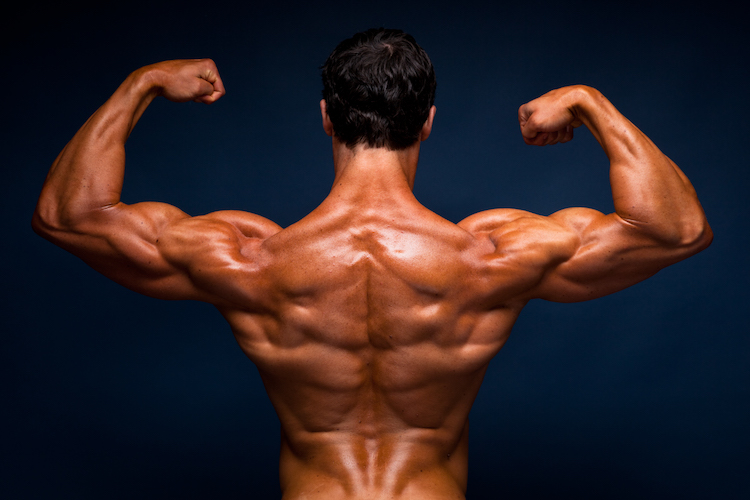
Vegan Athletes’ Calories and Macros
Both athletes eat over 3,000 calories a day: Crandall about 3,750 and Tresize, when he’s bulking, well over 4,000.
They both follow pretty much the same macronutrient split:
- Protein: 1 gram per pound of bodyweight
- Fat: 20 to 25% of calories
- Carbs: The rest of the calories
Again, this is about the same macros as other athletes whose diets we’ve examined like Stefi Cohen, Tia-Clair Toomey, Thor Bjornsson, and others.
Is it harder to go low carb as a vegan? Yes. But are you going to go low carb if your goal is to work out a lot and gain plenty of strength and muscle? No.
[Check out BarBend’s macro calculator to work out your own calorie needs!]
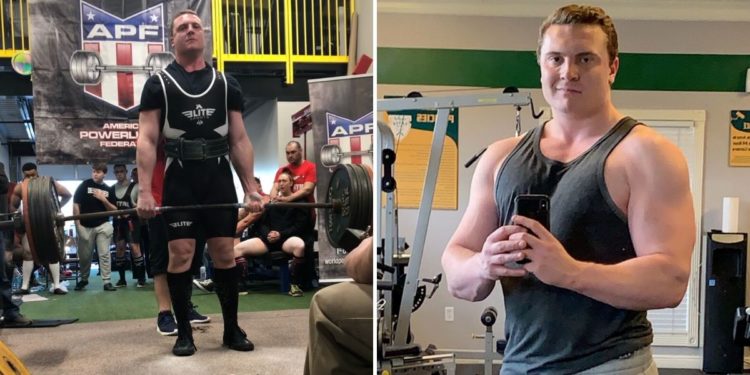
What Vegan Athletes Eat
Let’s start with the -241lb powerlifter.
Vegan Powerlifter Diet
“I eat 210 grams of protein, 441 grams of carbs, and 83 grams of fat,” he says, noting that he’s currently trying to lose a little weight so he’s hovering at around 3,300 calories.
And his protein sources?
“I eat a lot of nuts, seeds, legumes, lentils, pepitas — those are pumpkin seeds, they’re very high in protein and minerals,” he says. “Tempeh, tofu, edamame, in addition to plant based meats.”
He’s referring to foods like Beyond Burgers, Impossible Meat, the kind of “fake meat” that Derek the bodybuilder doesn’t eat much of.
A day of eating in Crandall’s life looks something like this:
Breakfast
- High protein Special K cereal with soy milk
- Tart cherry or pomegranate juice
- A banana
Post Workout
- Protein shake made with rice and pea protein (which, when combined, create a high quality protein on par with whey)
Lunch
- Tacos with “fake chicken”
- Rice
- Mixed vegetables
- An apple
Afternoon Snack
- Plant-based protein bar
Dinner
- Stir fry with extra firm tofu and mixed vegetables
- Salad with pumpkin seeds
Before Bed
- Smoothie with berries, orange juice, protein powder, and spirulina
[Related: Hear Weightlifter Clarence Kennedy Talk Snatching 185kg on a Vegan Diet]
Vegan Bodybuilding Diet
Derek Tresize’s diet, again, is a bit more whole food based.
It’s really the same year round, I just change portions and proportions of things.
Breakfast
- Oatmeal with an apple
Post Workout
- Protein powder with soy milk and creatine
Lunch
- “Huge” green salad with blackened tofu and balsamic vinegar
- Starchy carbs on the side (eg. sweet potato, white potato, sometimes lentil soup)
- Banana “ice cream” made with blended frozen bananas and some flavoring, like cocoa powder or strawberries
Afternoon Snack
- White bean shake, blended with berries, leafy green vegetables, and (calories permitting) peanut butter, bananas, dates, and walnuts
Dinner
- Beans and rice, Thai food, Indian food, what have you.
Vegan Athletes’ Supplements
Both athletes supplement with Vitamin B12, Vitamin D, and creatine, though Crandall also adds zinc, probiotic bacteria, and glucosamine for joint health. He’ll also add digestive enzymes to his protein shakes so that they can absorb as quickly as possible post workout.
Tresize isn’t as much of a fan of digestive enzymes, as they can break down fiber in the belly instead of in the large intestine, which is where much of it ferments and feeds the bacteria living in the colon.
“That’s the real benefit of fiber,” he explains. “It goes down there, ferments in your colon, provides prebiotics for beneficial bacteria, lowers blood pressure, and all these things. If you use digestive enzymes then it turns to sugar in the stomach. If you’re really uncomfortable and you eat a meal you know will tear you up then sure, take enzymes, but it’s not something I think you should rely on unless you really need to.”
Sure, some like to use digestive enzymes to help minimize bloating from eating a lot of fiber. What these athletes suggest, though, is to slowly increase your fiber intake over time. Swinging straight from keto to whole food vegan might produce digestive upset because your digestive tract (and the bacteria living there) aren’t accustomed to the fiber. But gradually adding more plant-based meals and foods to your diet — if that’s a goal of yours — could help to mitigate these issues without the requirement of supplements.
[Related: 5 Kinds of Fiber Athletes Should Know About]
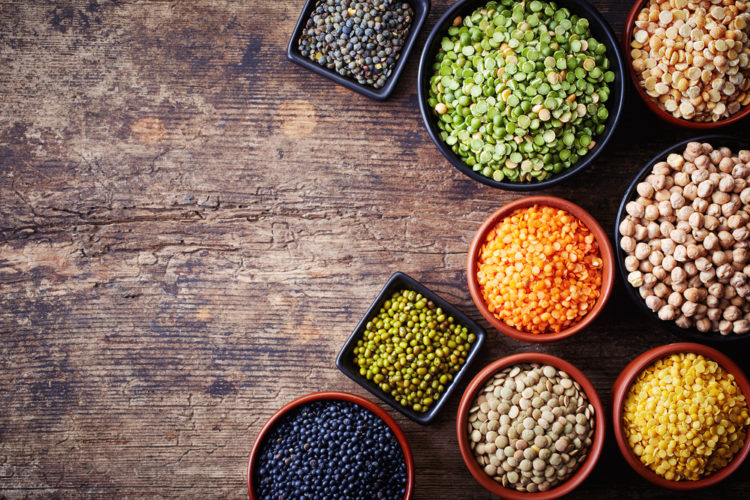
Vegan Protein Quality
Among other protein powders, the two are fans of pea protein as it’s high in the branched chain amino acids that are closely linked to muscle protein synthesis.(1)
Which brings us to protein quality, a contentious issue surrounding plant-based sports nutrition. A common argument is that vegan proteins are often “incomplete,” meaning they don’t contain all nine essential amino acids in roughly equal amounts like animal protein does.
There are a few answers to this concern:
- Both athletes eat soy, which is indeed a complete protein, as are many other vegan proteins like buckwheat and quinoa.
- Most of the other proteins they’re eating, like legumes, wheat, oatmeal, protein powder, fake meats, even potatoes are all pretty good sources of the branched chain amino acids mentioned above.
- These diets are really, really varied.
Many athletes out there stick to simple, repetitive meal templates where the carbs are pretty much always rice, sweet potatoes, and fruit. This is a totally valid way to reduce food stress, but the reason we’re emphasizing the variety of vegan diets is that all foods contain amino acids and practically every organization of dietitians has said that a well planned vegan diet will deliver all of the amino acids in abundant amounts, especially if they’re eating a lot of different foods.(2)(3)
“When someone says incomplete, they say it has less of some amino acids than you think you might need, but they’re still there,” says Tresize. “You just eat a normal diet throughout the day and get some measure of diversity, and you don’t have to worry about it at all.”
Does Soy Affect Your Testosterone?
Another common concern is that soy contains a plant form of estrogen, so people think it “feminizes” you by reducing your testosterone or increases your estrogen.
“One of the highly cited case studies is an elderly gentleman who developed gynecomastia, or larger breasts,” says Crandall. (Note that this man was drinking three liters of soy milk per day.(4)) “The thing is, you can’t draw conclusions from case studies — that’s not how the science works. Case studies’ only purpose is to point researchers in a certain direction, to say ‘Hey, you should look into this.’ And they found soy was probably not the cause of that.”
He’s right that the good research, including a meta analysis of thirty-two studies published in Fertility and Sterility, found soy doesn’t do anything to your sex hormones, and that included athletes and people taking up to 70 grams of it a day.(5)(6)
To learn more, check out our complete guide to soy and your hormones. (And remember that plant estrogen is also in apples, oats, berries, garlic, coffee, and a lot of other foods.)(7)
[Related: The Best Natural Ways to Increase Your Testosterone]
View this post on Instagram
Vegan Omega-3 Fatty Acids
Another concern is about Omega-3s, a type of polyunsaturated fatty acid that has links to reduced inflammation.(8)(9) Many athletes we’ve talked to supplement with them to help with joint health and longevity, and it’s hard for vegans to get a lot of them because their richest sources are fatty fish.
It’s true there are plant-based Omega-3s in some nuts and seeds (walnuts and flaxseeds get a lot of play here) but this form of Omega-3, called ALA, doesn’t absorb as well as EPA and DHA, the kinds you get in fish. The body converts ALA to EPA and DHA so it’s more usable, and some estimate that we lose up to 90 percent of it in that conversion.(10)
Some simply eat more ALA to make up for it, but there is one source of vegan EPA and DHA: algae.
“The supplement I take is algae derived, because that’s where fish are getting their Omega-3s,” says Crandall. “So I try to go directly to the source.”
“I have heard over time your body gets more efficient at converting ALA, but if you’re worried about it, algae is a very easy thing to supplement,” adds Tresize. “And a plant-based oil isn’t going to have the heavy metal loads and contaminants that a lot of fish oil has.”
View this post on Instagram
Benefits of Veganism for Athletes
So we’ve covered how to avoid nutrition pitfalls when going vegan, but are there advantages to it? Here are three reasons you might want to consider if you’r thinking of adding more plant-based meals to your diet.
- There’s a good chance a whole food-based vegan diet will drastically increase your intake of almost every micronutrient.
- It’s also likely going to increase your fiber intake, which research suggests might improve the health of your gut bacteria and thereby improve nutrient absorption.(11)(12)
- There’s increasing evidence that it might make your blood thinner, which could be a good thing for athletes — and not just because of lower blood pressure.(13)(14)
“One thing any good chemical engineer will tell you is if you increase the viscosity of the fluid going through a pump, that’ll damage the pump and decrease its efficiency,” says Crandall, who actually works as a chemical engineer. “So there’s a lot of research out there that plant based diets will make your blood more like water and easier to move around the body. Where that comes to the performance benefits side, apart from heart health, is it allows the blood to transport oxygen to your muscles a bit more quickly. It helps to break that barrier between the muscle and the blood just a bit faster and that can lead to a lot of benefits over time.”(15)(16)(17)
Wrapping Up
Those studies do indeed show thinner blood enhancing tissue oxygenation and benefitting sports performance, so it may be worth experimenting with more plant-based diets — or at least the occasional bean shake. Just make sure you speak with your physician before making any big changes to your diet or exercise regimen.
References
- Tömösközi S, et al. Isolation and study of the functional properties of pea proteins. Nahrung. 2001 Oct;45(6):399-401.
- Millward DJ, et al. The nutritional value of plant-based diets in relation to human amino acid and protein requirements. Proc Nutr Soc. 1999. May;58(2):249-60.
- American Dietetic Association, et al. Position of the American Dietetic Association and Dietitians of Canada: Vegetarian diets. J Am Diet Assoc. 2003 Jun;103(6):748-65.
- Martinez J, et al. An unusual case of gynecomastia associated with soy product consumption. Endocr Pract. 2008 May-Jun;14(4):415-8.
- Hamilton-Reeves JM, et al. Clinical studies show no effects of soy protein or isoflavones on reproductive hormones in men: results of a meta-analysis. Fertil Steril. 2010 Aug;94(3):997-1007.
- Kalman D, et al. Effect of protein source and resistance training on body composition and sex hormones. J Int Soc Sports Nutr. 2007 Jul 23;4:4.
- Kuhnle GG, et al. Phytoestrogen content of beverages, nuts, seeds, and oils. J Agric Food Chem. 2008 Aug 27;56(16):7311-5.
- Weylandt KH, et al. Omega-3 fatty acids and their lipid mediators: towards an understanding of resolvin and protectin formation. Prostaglandins Other Lipid Mediat. 2012 Mar;97(3-4):73-82.
- Grimstad T, et al. Salmon diet in patients with active ulcerative colitis reduced the simple clinical colitis activity index and increased the anti-inflammatory fatty acid index–a pilot study. Scand J Clin Lab Invest. 2011 Feb;71(1):68-73.
- Davis BC, et al. Achieving optimal essential fatty acid status in vegetarians: current knowledge and practical implications. Am J Clin Nutr. 2003 Sep;78(3 Suppl):640S-646S.
- Bäckhed, F. et al. The gut microbiota as an environmental factor that regulates fat storage. Proc Natl Acad Sci U S A. 2004 Nov 2;101(44):15718-23.
- Regulation of abdominal adiposity by probiotics (Lactobacillus gasseri SBT2055) in adults with obese tendencies in a randomized controlled trial. Eur J Clin Nutr. 2010 Jun;64(6):636-43.
- McCarty, M et al. Favorable Impact of a Vegan Diet With Exercise on Hemorheology: Implications for Control of Diabetic Neuropathy. Med Hypotheses . 2002 Jun;58(6):476-86.
- Ernst, E et al. Blood Rheology in Vegetarians. Br J Nutr . 1986 Nov;56(3):555-60.
- Barnard, N et al. Plant-Based Diets for Cardiovascular Safety and Performance in Endurance Sports. Nutrients . 2019 Jan 10;11(1):130.
- El-Sayed, M et al. Haemorheology in Exercise and Training. Sports Med . 2005;35(8):649-70.
- Smith, M et al. Associations Among Hemorheological Factors and Maximal Oxygen Consumption. Is There a Role for Blood Viscosity in Explaining Athletic Performance? Clin Hemorheol Microcirc . 2015;60(4):347-62.
